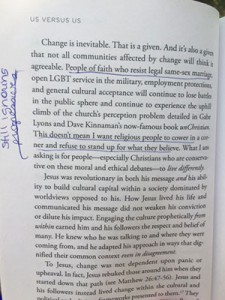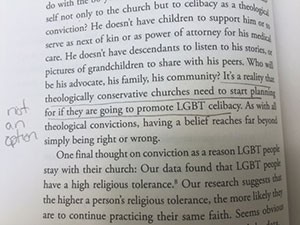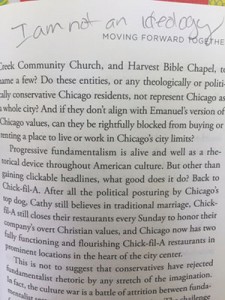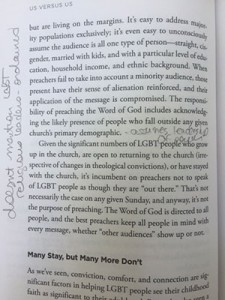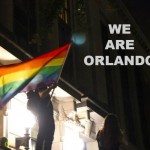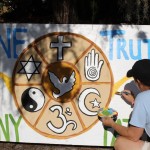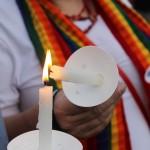Deborah Arca, my friend and Patheos editor, invited me to the Andrew Marin book club this month to review his new book, Us vs. Us. Rumor has it, I was one of the Patheos bloggers selected by Marin himself, or at least one of his people to take up this task.
Now, I’m not trained in the delicate art of book reviews, so the best I can hope to do here today, is share with you my experience of reading this piece of work. (see what I did there?)
Here’s the high level of how it went.
Um, how many times can one fellah make an “I” statement in an introduction? (I counted no less than 125 instances.)
Dude, like who is your audience and what is your motive?
Hellloooo, like where are all the progressive Christians?
Interestingly enough, when Deborah asked me to chime in, I really had no idea who Andrew is or what he does. As a queer Christian (supposedly someone about who the book is written), maybe that is significant. Maybe not. I committed to starting the book before doing the Google boogaloo, but about half-way through the intro I did indeed feel called to consult the oracle. We can talk about what I found out later, but for now suffice it to say, my reading would confirm my snooping.
How the book describes itself: “Drawing on the findings of the largest-ever scientific survey of LGBT religious backgrounds, beliefs and practices, Andrew Marin offers clear direction for both sides of a long cultural battle, sacrificing neither conviction nor integrity, and helping us find common ground and hope rooted in Christ alone.”
A few notes about the Marin Foundation’s scientific survey: From the 1,712 usable LGBT participant surveys, 60% were gay males and 77% were white. Catholics and “non-denominational evangelicals” make up 43.3%. The UCC is only represented by 1.4% of respondents and there are no reported responses from LGBT Christians belonging the the MCC. There is no information in the book describing geographical or socio-economic diversity of respondents. Few if any quotes are cited (well, anonymity of course). The one Jewish story shared in the book is from “Aaron”, a gentleman who “felt he need to leave his synagogue to explore Jesus.” I’ll just leave all that right here…
So, what was my take-away? Well, lots and lots of notes in the margins. A conviction that his audience is conservative church-goers, a creeped out feeling about his motive and a rising fury at the blatant exclusion of progressive church as an option for LGBT people.
From the first chapter, entitled “There is No They”, it is clear to this reader that Marin is primarily addressing conservative church folks. Why? Well, that chapter is solely focused on his survey’s finding that 86% of LGBT people were raised in a faith community. Here he is convincing his reader that queer folks have been people of faith. Other chapters go on to explain LGBT exodus from church (from the perspective of a straight, white male) and how we are the new prodigals. I think it is more than significant that he names us as prodigals because in a word, that describes the queer lived reality as greedy and sinful (check out Luke 15:11-16) who when they come to their senses (um) return home to beg forgiveness.
He has the audacity to equate the discomfort of having conservative ideas challenged with the trauma of having one’s selfhood damned.
Page 57 – “…trauma has touched both sides of the culture war. Church members who feel marginalized by their community for their conviction [that word matters here] and LGBT persons who have left their faith community [oh no, not kicked out] with hurt feelings…”
For me this smacks of privileged delusion. The conservative is traumatized and the queer Christian left with hurt feelings? Really? I tell you that your thinking maybe be a little off, you tell me that my humanity is off. Yeah, no.
So the straight, white Christian homophobe has their homophobia called out and challenged and they are traumatized, but I am called an abomination, cut off from my mother and religion and threatened by “Christians” regularly and I just have hurt feelings. Sorry I hurt your foot while you were kicking in my teeth.
About motive:
Andrew Marin, to my knowledge, has never verbalized an affirmation of homosexuality, same-same sex marriage or LGBT ordination in the church. So it is understandable to have a healthy sense of skepticism as I read this book. The more I read, the more convinced I became that his motive is far from neutral (though that is not better since neutrality in the case of oppression simply supports the status quo). No, the more I read, the darker his motive feels.
Marin’s book seems to advocate for a reconciliation between LGBT people of faith and church-going Christians. Whether he realizes it or not (I think he does), this still perpetuates a false dichotomy of gay vs Christian.
So my main question for Marin is a two-fold why.
Why should a queer person of faith seek reconciliation with people who do not and will not affirm their sacred worth?
Why should conservative Christians who will not affirm the sacred worth of queer people seek to include them in their community?
This is not about agreeing to disagree about a set of ideas. This ain’t about theological quibbling over what happens in the breaking of bread or taking of wine. Nor is it sprinklers and dunkers agreeing to disagree about the timing and quantity of water at baptism.
This is about one side of the equation agreeing to be in relationship with people who see lesbian, gay, bisexual and transgender people as sick or broken, in need of being fixed before they damn themselves to eternal suffering in hell’s fire.
“Our greatest challenge hindering a new reality [to learn from and understand our other] is the pointless cycle of trying to convince our other to believe the same as we do.” (p.152)
NO – I don’t need you to believe that I am gay. I just am gay. Nor am I willing to be in relationship with someone who is operating under the theological imperative to save me from being gay. That is not convincing me to believe something I don’t, that is trying to conceive me to be something that I am not.
Marin himself confirms my suspicion when a paragraph later he talks about Jesus’ radical openness to the unclean. Hmmmm, who exactly is the unclean in this scenario and who is Jesus? How very magnanimous it is of the conservative Christian to be open to the unclean homosexual.
Then on page 153, my pray the gay away meter went berserk! “If a theologically conservative person has thoughts of reaching out to someone in the LGBT community, the initial thought is not possibility but anxiety; This is probably going to be very intense. Or awkward. It’s not going to work anyway, so I don’t; think it’s worth it…”
It is probably going to be intense? As intense as being told you are going to burn in hell or as awkward as being told “get the hell out of my house, pervert!” Or as intense as hating yourself and living a lie, rejecting God in the process because you reject the way you are created? And what exactly is not going to work? What do you imagine is the goal of this conservative person hoping to reach out to a gay Christian? From my vantage point, this just oozes of conversations that subtly turn from, let’s get to know one another to, you need to repent of your sins and leave your partner to only have sex with a man, who you will have to marry to prove you have been cured. Or, as we’ve often been told, you can still be gay and go to heaven, you just have to be celibate.
One concept that seems to utterly escape Marin is the distinction between challenging ideas and challenging being. So either Andrew is a dull boy, or Andrew has a couple of nefarious cards up his sleeve. I think it’s the latter.
About church:
Straight Christians have the privilege of considering what they think and how they feel about homosexuality. I on the other hand, just am homosexual. It is not an idea or even a theological proposition for me. It is an integral part of my humanity.
“Loving in difference is possible” (p.56) – yep, and relocating in love is also possible.
A Christ-centered life can and does include fully embodied and lived LGBT lives, including sex. And guess what, y’all? Marin wholesale ignores the fact that there are over 1,300 open and affirming churches in the United Church of Christ, a whole denomination founded by queer Christians called the MCC and wholly affirming congregations in the UMC, the PC(USA) and the Episcopal church – check out this handy, dandy map compiled by Believe Out Loud.
We come in all shapes and sizes – individuals, prayer partners, Sunday School classes, campus ministries, congregations and whole denominations that affirm that each individual is a child of God, recognizes “that we are called to be like one body with many members, seeking with others of every race, ethnicity, creed, class, age, gender, marital status, physical or mental ability, sexual orientation, gender identity and gender expression to journey together toward the promised realm of God.” – (from the Open and Affirming statement of Old South Church, United Church of Christ, Boston, MA)
We come from neighborhoods, towns, cities and states all over the country – yes, even Georgia.
And there are Christians who are leaning into this new day with grace and compassion even if they are uncomfortable yet faithfully open to discerning how the Spirit is moving us all closer to the beloved community.
What I invite you to do is to look around for the Christians in your life, in your news feed and in the media, who are a lifting up voices of faithful affirmation of their LGBT siblings. Then I hope you will share that in what ever way you feel called. If people don’t know we exist, then that is our fault too. Let US be the voice of the people that the media willfully ignores. Let US be the people’s microphone and magnify Love that does not ask LGBT people to live a lie.
And I ardently implore the authors, bloggers and everyone in the media to work a little harder to fairly represent the full spectrum Christian voices in this ever-evolving conversation.
Here are a few resources to get us started…
Association of Welcoming and Affirming Baptists Members of the Association of Welcoming & Affirming Baptists (AWAB) are churches, organizations, and individuals who are willing to go on record as welcoming and affirming all persons without regard to sexual orientation or gender identity, and who have joined together to advocate for the full inclusion of lesbian, gay, bisexual and transgender persons within Baptist communities of faith.
Believe Out Loud – is about helping churches live out this Christian principle by becoming fully inclusive of all people, regardless of sexual orientation or gender identity.
Brethren/Mennonite Councit for LGBT Interests– The mission of BMC is to cultivate an inclusive church and society and to care for the Mennonite and Brethren lesbian, gay, bisexual, transgender, and allied community.
Catholic – DignityUSA works for respect and justice for all gay, lesbian, bisexual, and transgender persons in the Catholic Church and the world through education, advocacy and support.
Disciples of Christ – The Gay, Lesbian and Affirming Disciples Alliance is a presence working for the full dignity and integrity of gay, lesbian, bisexual, transgender and affirming people within the Christian Church (Disciples of Christ).
Episcopalian – Integrity USA Since 1974, Integrity has been a faithful witness of God’s inclusive love to the Episcopal Church and the lesbian, gay, bisexual, and transgender community. We are working for the full inclusion of all the baptized in all the sacraments.
Lutherans Concerned/North America works for the full inclusion of lesbian, gay, bisexual, and transgender Lutherans in all aspects of the life of their Church and congregations. They provide a place of comfort and safety. They reach out and teach that Christ’s message, the Gospel, is for everyone equally. They call for the blessing of committed and covenanted same-gender relationships, and for the ordination of those called to minister.
PC(USA) More Light Presbyterians – a network of people seeking the full participation of lesbian, gay, bisexual and transgender people of faith in the life, ministry and witness of the Presbyterian Church (USA)
United Church of Christ Open & Affirming (ONA) Program – ONA is “shorthand” for Open and Affirming, the designation for congregations, campus ministries, and other bodies in the United Church of Christ which make public statements of welcome into their full life and ministry to persons of all sexual orientations and gender identities.
United Methodist Reconciling Ministries Network mobilizes United Methodists of all sexual orientations and gender identities to transform our Church and world into the full expression of Christ’s inclusive love.
That All May Freely Serve advocates for an inclusive church for all who are disenfranchised: A church that honors diversity and welcomes lesbian, gay, bisexual, and transgender persons as full members. Full membership includes eligibility for ordination to the offices of elder, deacon, and Minister of Word and Sacrament.
The Gay Christian Network (GCN) is a nonprofit ministry supporting Christians worldwide who happen to be lesbian, gay, bisexual, or transgender (LGBT).
The Institute for Welcoming Resources at the National Gay and Lesbian Task Force is a networking hub for movement leaders and a source of downloadable toolkits and curriculum for your church.

